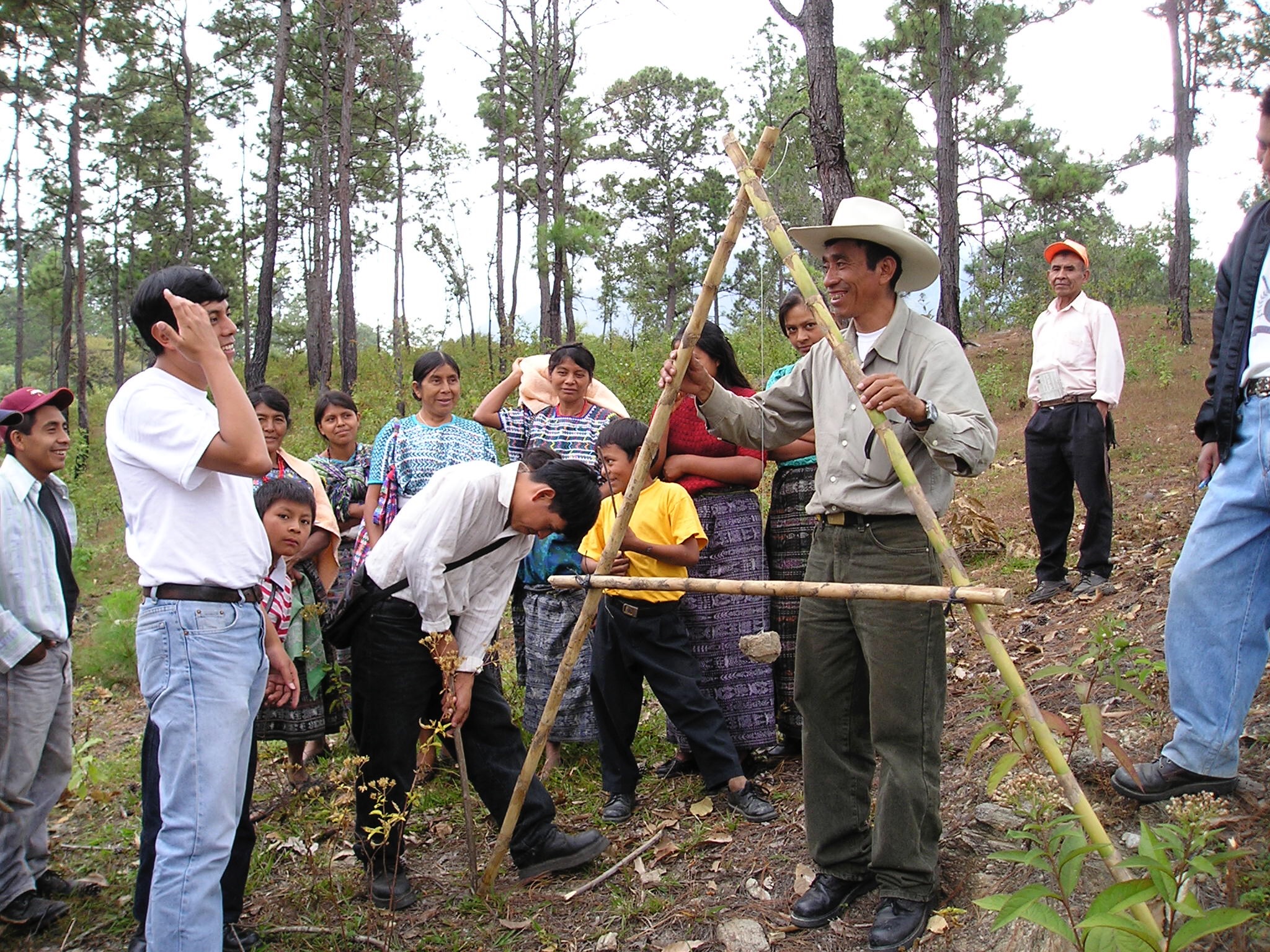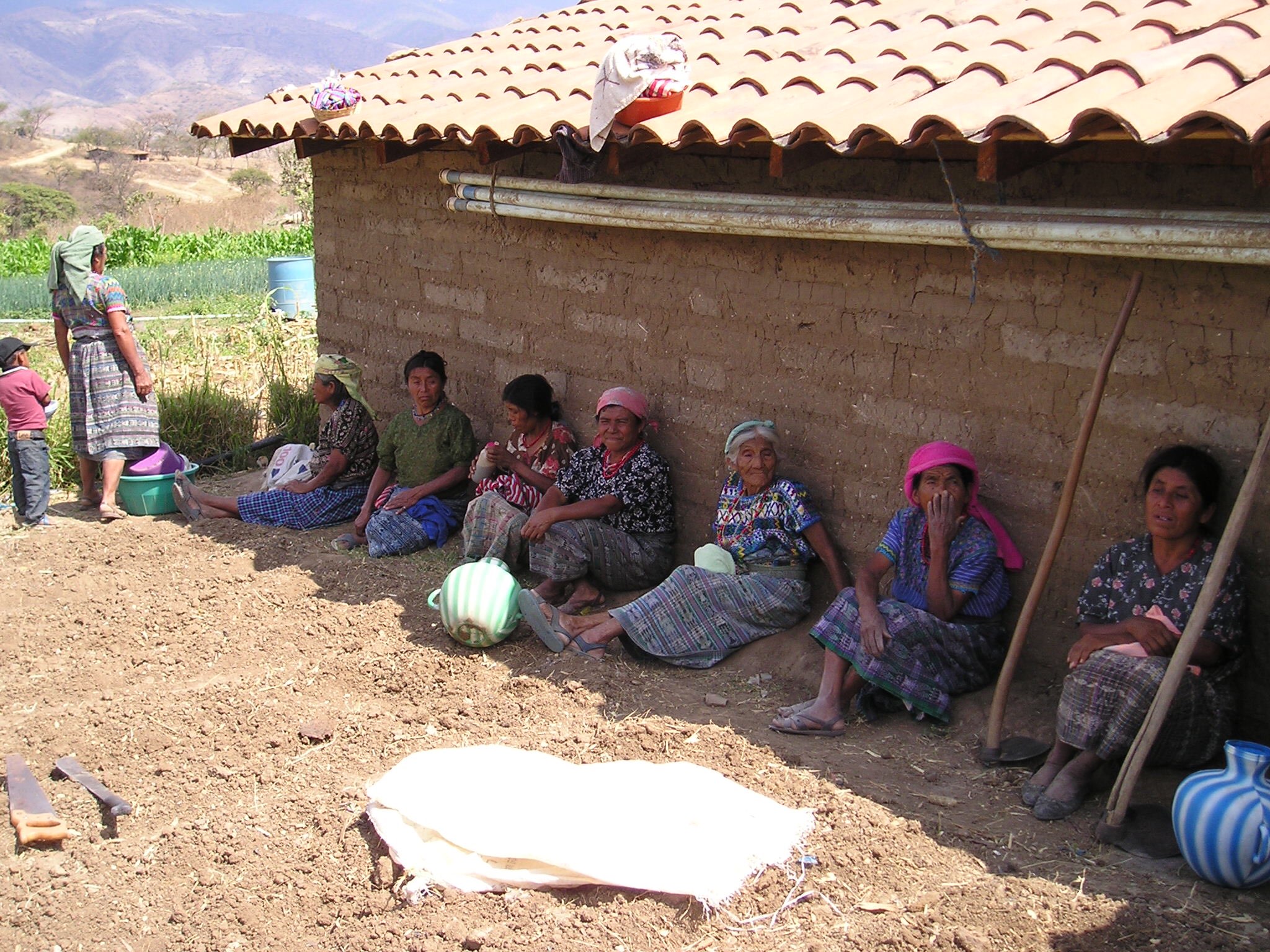How Our Work Began
By Sarah Montgomery

Before The Garden’s Edge or the Qachuu Aloom Association existed, an Achi Maya man, named Cristobal Osorio Sanchez from the village of Rio Negro was trying to encourage other farmers in the villages surrounding Rabinal, Guatemala to return to their traditional agriculture practices. Cristobal is a survivor of a series of brutal massacres that happened in the early 1980s in Guatemala, where many of the members of his village and family were murdered to make way for the Chixoy Hydroelectric Dam. A total of 3,400 people lost their ancestral lands, which included their homes, burial grounds, sacred sites, livelihoods, agricultural fields, and fruit trees that are all now underwater. Cristobal and other survivors of Rio Negro were forcibly relocated to a government-built town, outside of Rabinal, called Pacux with no land to farm.
Cristobal noticed something disturbing about how people around Rabinal were farming. He noticed how depleted and eroded the soils were. When he lived in his beloved Rio Negro, he and his community still farmed the “old” way, the way his ancestors had farmed for thousands of years. They had healthy soils, ancestral seeds, and animals, and lived in a reciprocal relationship with the natural world. The farmers he saw in Rabinal were dependent on agricultural inputs, using modern techniques and hybrid seeds, that were destroying the hillsides, and eroding deep cultural practices tied to traditional agriculture and seed care. The armed conflict, and foreign “aid”, were creating a cycle of dependency, leaving people and the land to suffer even more loss.
Like Rio Negro, the dozens of villages around Rabinal had also been deeply affected by the civil war and suffered their own series of massacres, in what was later labeled as Genocide by the United Nations. The Guatemalan army with backing from the US government had murdered hundreds of thousands of people, raped, tortured, and disappeared others, as well as burnt homes, fields, and killed or stole livestock. Many of the native seeds disappeared in the flames, breaking a cycle of self-sufficiency that had helped people survive for generations.
Cristobal took it all in and decided to make a change and bring some healing to the land and his people, demonstrating an act of extreme courage and resilience in the face of the greatest tragedy imaginable.

In 2003, my friends Aaron Lemmon, and Marcos Ramirez, from New Mexico and I were moved to action by the horrific stories we had heard about the violence in Rabinal. We responded to a call from widows in Rabinal for support building home gardens in their villages. Soon after I met Maria Magdalena (Elena) Alvarado Ixtapa, a Maya Achi linguist and activist, who helped me connect with many more widows around Rabinal.
Shortly after arriving in Rabinal, the doorbell at my house rang. A man with a twinkling smile stretched out his hand, and declared, “My name is Cristobal Osorio Sanchez. I am a survivor of the Rio Negro massacre. It’s my dream to start an organization to bring back the traditional farming practices of the Maya Achi. Can I come in?”
Cristobal shared his story with us and the next day we began hiking the hills together. We tramped behind Cristobal and watched him work his magic as a master motivator, leader, and organizer. He’s also a practitioner of “Campesino a Campesino”, a decentralized movement that originated in Guatemala in 1972 as a response to the collective impacts of the armed conflict, colonialism, the impositions of large-scale development programs, and the paternalism of charity work. This horizontal way of working connects farmers to one another to share practical skills in land management and farming. He teaches farmers in his Achi language and teaches through doing. That means picking up a hoe or pickax and helping to build a garden, a fence, or construct an “A” frame, a simple level used to measure contours to keep soil from eroding.


Cristobal, Maria Elena, Sarah, Marcos and Aaron combined these two ideas and formed, Proyecto de Producción de Alimentos y Semillas (PPAS) or Food and Seed Production Project. That first year, they started with 12 farmers. It was hard to organize. People were still afraid because during the war any kind of organizing was seen as subversive and people were often killed for participating in social projects. But we forged on, led by Cristobal and Elena’s determination and the ancient seeds, who quickly taught us that hope and strength could germinate in hearts and gardens once again.
In those early years of PPAS, widows, and survivors from the civil war, planted native seeds and cultivated medicinal plants, finding and sharing small handfuls of what seeds still survived. Many seeds had been lost as people fled their villages during the war. The military had burnt fields filled with precious seeds that had been lovingly tended and cared for in that special bioregion for millennia as a way of creating fear and domination. When the foreign aid agencies, and government programs moved in, they perpetuated dependency with handouts and they introduced values that broke thousand-year-old cycles of subsistence agriculture, and deep traditional ways. But our work was different. As the seeds started to come back, especially the ancient and powerful Amaranth plant, the old stories and culture began to return along with the seeds. With time, more and more people became interested as they saw their neighbors breaking their dependency on outside aid, and earning some extra income from their surplus garden vegetables and seeds. People also shared their stories about how they were no longer dependent on seasonal migration to coastal plantations to make extra money for their families.


In 2006, they achieved Cristobal’s dream and formed Qachuu Aloom ¨Mother Earth¨ Association with 400 seed grower members. His dream is now the shared dream of many other dedicated individuals who work at or are members of Qachuu Aloom. We have brought back many seed varieties and traditions that had almost completely disappeared from the area. Members of Qachuu Aloom can now plant year after year without relying on foreign aid. In fact, the seeds they grow are now sold to some of the very aid organizations that were once part of the problem, teaching those agencies the importance of developing more sustainable practices.
In 2007, I moved back to New Mexico from Guatemala to form, The Garden’s Edge, as a 501(c)3 to continue to support and grow that original work. The Garden’s Edge supports the on-the-ground work of Qachuu Aloom in Guatemala as well as other local projects and leaders who have emergent ideas for facing the many difficulties of our time. We also have expanded past Guatemala to connect farmers to each other across borders in order to tell their stories, share their practices and inspire each other. This cross-cultural sharing is nothing new. These are the old trade routes that have always existed between the global North and South, but that political borders and foreign policy try to block.

At the Garden’s Edge, we have a different way of working than most NGO’s. We do not believe we have the answers and need to “help” with aid and ideas. We listen to our partners, which include the voices of the seeds and the people who care for them. We help facilitate experiences where people can share their knowledge, and worldview with others. This work is called Seed Travels. It’s a movement that follows the Campesino a Campesino model of horizontal sharing of experiences and knowledge. As farmers from Guatemala have shared their stories and practices with our partners in the North, we plant their seeds of hope in our own gardens, and recognize in them the stirrings of forgotten responsabilites and ways of being with the land and each other. Many people now carry on this work to share the stories of Rio Negro, to plant the seeds, and to rediscover our own ancestral seeds. We work to awaken the hope, stories, and memories of the seeds. There are many voices that need to have a place at our collective table; together we can germinate new ideas of hope and action for the future.
